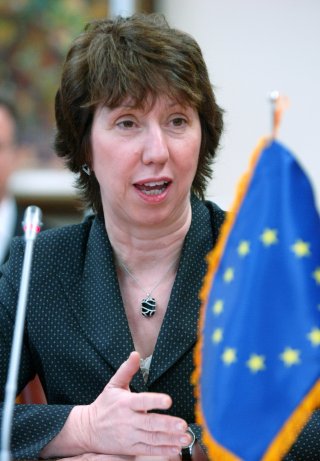European Union foreign policy chief Catherine Ashton has renewed her invitation for Iran to hold talks on its nuclear program next month, urging Tehran to reply "in the next few days", Press TV reported.
"While Iran has indicated through the media that they welcome the offer... she is still awaiting a formal response," a spokesman for Ashton said on Friday.
"She is looking forward to Iran formally responding positively to her proposal in the next few days to make this happen," he added.
In a letter to Iranian Supreme National Security Council Secretary Saeed Jalili, Ashton asked Tehran to take up the offer of talks, reiterating the proposal to hold the meeting in or near Vienna from November 15 to 17.
"The main focus of the meeting would be on the question of the Iranian nuclear program, not excluding any other items pertinent to the discussion," reads a copy of the letter seen by Reuters.
"The meeting could start with a dinner on November 15, followed by two days of consultations to enable substantial discussions," it said.
"Given the proximity of the suggested dates and the diary constraints of the parties involved, I do hope for your early and positive response," Ashton wrote in another part of the letter.
On October 14, the EU foreign policy chief put forth a proposal to hold a three-day round of nuclear talks between Iran and the P5+1 group - Britain, China, France, Russia, the United States, and Germany - in mid-November in the Austrian capital.
Iranian Foreign Minister Manouchehr Mottaki welcomed the new offer for the resumption of talks over Iran's nuclear energy program.
Tehran blames Western countries for the delay in the talks, which have been stalled since October 2009 when the two sides met in Geneva.
Iran announced it was prepared to resume nuclear discussions in September, but insisted that any negotiations must be conducted within the framework of the Tehran Declaration.
The foreign ministers of Iran, Turkey, and Brazil signed a declaration in Tehran on May 17, according to which Iran would ship 1200 kilograms of its low-enriched uranium to Turkey to be exchanged for 120 kilograms of 20 percent enriched nuclear fuel rods to power the Tehran research reactor, which produces radioisotopes for cancer treatment.
Despite the fact that Iran agreed to conduct the fuel swap in a third country, on June 9 the UN Security Council passed a resolution imposing new sanctions on Iran.
The US and the EU also rebuffed the trio's declaration and pushed for the imposition of additional sanctions on Iran over the allegations that Tehran is concealing a clandestine nuclear weapons program.
Tehran has vehemently rejected the allegations of diversion, saying it needs nuclear energy to meet its growing domestic demand for electricity.
Iran is a signatory to the Nuclear Non-Proliferation Treaty and thus has the right to enrich uranium to produce fuel.
And the International Atomic Energy Agency has conducted numerous inspections of Iran's nuclear facilities but has never found any evidence showing that Iran's civilian nuclear program has been diverted to nuclear weapons production.






